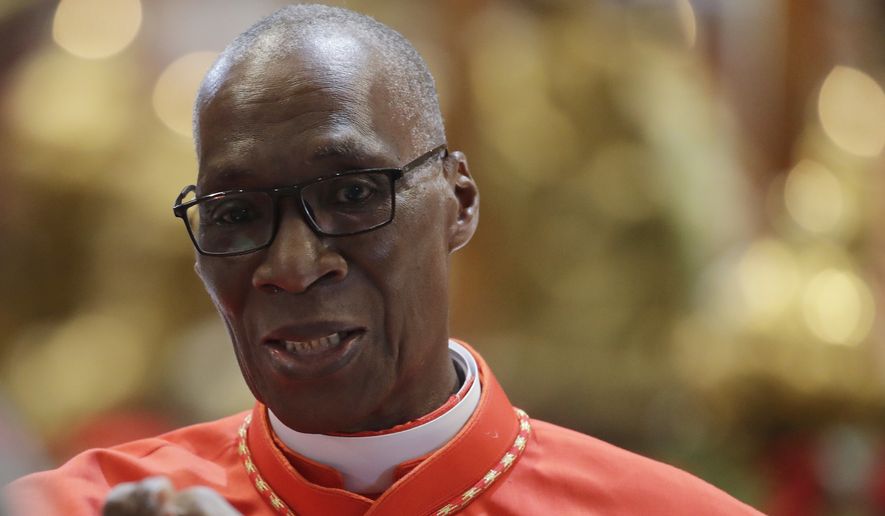BAMAKO, Mali — Dressed in a white frock, the Rev. Samuel Coulibaly, a Catholic priest, smiled as he explained how religious communities have long lived in peaceful coexistence in this West African country.
“In each of our families, there are Christians, Muslims and even sometimes those who are practicing the traditional religion” — animism, Father Coulibaly said.
But that era of peaceful coexistence has been on trial ever since the July appointment by Pope Francis of Cardinal Jean Zerbo, Mali’s first “prince of the church.”
Locals say the appointment has given new prominence to the Christian community and sparked resentment among some Muslims. As a result, extremists have stepped up attacks on Cardinal Zerbo’s flock, forcing many Catholic churches to close.
“There are threats and sometimes attacks on churches in remote villages,” said Damien Diarra, a 40-year-old Christian who works with the government’s tourist authority.
“Because of this threat, people are afraid — including the priests — to go to those churches,” he said.
All sides are wary of allowing the tensions to fester. Christian-Muslim communal clashes have proved a major flashpoint in other divided African countries, including Nigeria, Uganda, the Central African Republic and Egypt.
Christians compose about 5 percent of Mali’s 18 million people. About 2 percent are animists. The rest are Muslim.
Cardinal Zerbo has a record of working for better relations between Mali’s Christians and Muslims. In appointing him this summer, Francis said he was trying to highlight “those neglected areas and complex situations of war and poverty while it reaffirms the interest of the Catholic Church.”
Mr. Diarra and others blame the attacks on armed men linked with the jihadi leader Amadoun Koufa, co-founder of Jama’at Nosrat al-Islam Wal-Muslimin, an al Qaeda-affiliated group that aims to create an Islamic caliphate in Mali.
Mali has been fighting jihadis for years. Until French military intervention in 2012, extremists held sway in large swaths of the northern part of the country. More recently, France has stepped up its involvement in its former colony by creating a regional force — the Sahel G5, which includes Burkina Faso, Mali, Mauritania, Niger and Chad — to accelerate operations against militants.
The U.S. government has also pledged funds to support the operations.
Ousmane Diakite, a Bamako-based analyst, said, “These jihadists hold several foreign hostages, including a Colombian nun and probably the American who was kidnapped in Niger.”
He was referring to an American aid worker taken in October from his home in Niger and believed to have been transferred to Mali.
Targeting churches
Jama’at Nosrat al-Islam Wal-Muslimin is being led by Iyad Ag Ghaly, a Malian Tuareg and prominent extremist who is wanted by the U.S. government. The group routinely ransacks Christian houses of worship, Christians here say.
In September, for example, terrorists struck a church in Dobara, a village in remote central Mali, burning sacred objects and vowing to return and kill the congregation if they continued worshipping there.
Around the same time, militants also ransacked churches in Bodwal, Djidiam and Douna, also in central Mali. Terrorists have threatened to destroy other churches in the area too, church officials say.
In a report issued in September, Human Rights Watch said it had documented “serious abuses by Islamist armed groups in central Mali … including summary executions of civilians and Malian army soldiers, destruction of schools, and recruitment and use of children as soldiers.”
The rights group said attacks on Christians and other religious and ethnic minorities in Mali’s Mopti region “has raised concerns of more widespread abuses.”
Sectarian violence has not spread so far to the capital of Bamako. But Christians in the city are reporting an increasing number of anti-Christian incidents that threaten the secular coexistence among religious communities.
“I’m used to having my clothes sewn at a tailor’s in Bamako,” said Dieudonne Tembely, 36, of Bamako. “But on Easter this year, he refused to serve me.”
The tailor’s imam, a Muslim clergyman, advised him not to sew clothes with the likeness of Jesus Christ on them, Mr. Tembely said.
Locals attribute the surge in attacks on churches in the center of the country to the elevation of the cardinal.
“I heard a religious leader on a Muslim radio station claiming that there is an international plot to make of Mali a Christian country now, to promote Western values,” Mr. Tembely said.
Christians also say that greater prominence and visibility for their community sparks misunderstandings with some conservative Muslims. Christian missionary groups say the violence and unpopularity of jihadi groups like Nigeria’s Boko Haram have also inspired a wave of converts to Christianity in a number of African countries, further upsetting Muslim community leaders.
“In August, a conservative Muslim leader made a public declaration on how [Muslims] will combat the Christian religion and those promoting it,” said Mr. Dieudonne. “He was angry because he thinks government officials have more regard for Christian leaders” than Muslim ones.
Mr. Diakite noted that jihadis didn’t attack the churches in the country’s center when they controlled the northern region. “I see the current attacks on churches as the rise of anti-Christian feeling in the last few months,” he said.
Still, Father Coulibaly says he is optimistic that Muslims and Christians can avoid clashes if they could find “love in their hearts.”
“We can live together despite our differences,” he said. “We must not forget what has been our strength so far: the historical ties that bind us must be stronger than our religious affiliation.”




Please read our comment policy before commenting.